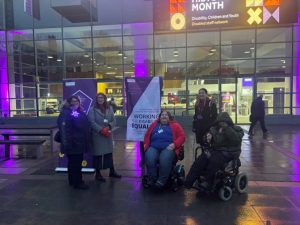
Rachel Heyes: What are Staff Networks?
If you’re new to the concept of staff network groups, you’re not alone. Before joining the University of Manchester, I hadn’t encountered them either. These networks are invaluable resources, offering peer support to staff who may face marginalisation or oppression. They play a crucial role in advocating for equality and inclusion, working hand in hand with the university to shape strategies and policies. Supported by the Directorate of Equality, Diversity, and Inclusion, these networks, led by elected chairs representing various segments of the university community, strive to foster a culture of belonging.
The University of Manchester hosts a diverse array of groups catering to different needs and backgrounds. From the Black Asian Minority Ethnic (BAME) staff network group, to the LGBT+ ALLOUT (lesbian, gay, bisexual, trans, non-binary and gender diverse staff) staff network group, or Women@Manchester staff network group, there’s something for everyone. Joining is easy – simply sign up for a ListServ mailing list, hop into a Teams space, or attend a meeting. These networks offer more than just a sense of belonging; they provide a platform for mutual support, shared experiences, and learning from one another.
As Co-Chair of the Disabled staff network (DSN) group alongside Laura Howard and Steve Pierce, I’ve had the privilege of witnessing first-hand the impact these networks can have. Our goal has always been to create positive change and support our members in every way possible. By prioritising inclusivity and actively engaging with our community, we’ve been able to address key issues, organise events, and foster open communication with university leaders.

From left Rachel Heyes, Jackie Carter, Kathryn Bradley and Laura Howard and Hamied Haroon.
Some of my most memorable moments include collaborating with EDI leaders like Kathy Bradley, Prof. Jackie Carter, Dr Hamied Haroon, and Banji Adewumi MBE whose dedication to equity is truly inspiring. Lighting up the Alan Gilbert Learning Commons in purple for Disability History Month stands out as a particularly touching memory. It’s moments like these that reaffirm the importance of our work and drive us to do more.
From expanding my network through LinkedIn to organising events with prominent advocates like Cherylee Houston MBE, or Jamie Shields, every opportunity to amplify our voices and promote healing has been immensely rewarding. Introducing members to meditation, gong baths, and other healing techniques has been particularly fulfilling, reminding us of the power of community and support.
Being witness to the establishment of the Neurodivergent Network by Matthew Harrison, with interest from a hundred members of staff during their inauguration event, was a privilege. It demonstrates how much this type of network was needed, and it’s heartening to see the enthusiasm and support it has garnered. Becoming a member of this network and facilitating celebratory events has not only enriched my experience but also provided a platform for exploring my own late diagnoses. It’s through these shared experiences and mutual support that we continue to grow and advocate for each other’s needs.
Arranging accessible socials for disabled and neurodivergent people like me has opened up my world, and prevented me from feeling so alone, isolated, and vulnerable. It’s been transformative, offering a sense of connection and community that I previously thought was out of reach. These social events have become lifelines, fostering friendships and support networks that extend far beyond the confines of the university.
Despite the challenges we face, both as individuals and as a network, I remain committed to serving the DSN community. However, it’s crucial to recognise the strain that this commitment can place on our health and well-being. Moving forward, I hope to see greater recognition and support for the invaluable work undertaken by network leaders. While the road ahead may be challenging, the knowledge that we’re making a difference keeps us going.
So, I invite you to explore the diverse range of staff network groups and support networks available at the University of Manchester. Whether you’re looking for a sense of community or an opportunity to contribute to inclusion, there’s a place for you here.
List of Networks:
List of Networks:
- Black Asian Minority Ethnic (BAME) staff network group
- Disabled staff network (DSN) group
- Neurodivergent staff network group
- LGBT+ ALLOUT (lesbian, gay, bisexual, trans, non-binary and gender diverse staff) staff network group
- Women@Manchester staff network group
There is also a variety of support groups:
- Menopause support group
- Parents peer support group
- People impacted by cancer peer support group
- Stress at work staff network group
- Staff with caring responsibilities peer support group
- Catholic chaplaincy staff network
- Christian staff network (Manchester Universities’ Staff and Postgraduate Christian Fellowship)
- International staff network
- Muslim staff network
- Dharmic cultures and philosophies (including, but not limited to, Buddhists, Hindus, Jains and Sikhs) staff group
- Vegan staff network
- Climate staff network
- Executive assistant (EA) and Personal assistant (PA) staff network
- Technical Excellence at Manchester (TEaM) staff network
- Women in Biology, Medicine and Health (WiBMH) staff network
- Women in cancer staff network (women working in all aspects of cancer research)
- Women in Environmental Sciences (WiES) staff network group
By Rachel Heyes, Learning Technologist and Co-Chair of the Disabled Staff Network (DSN)






0 Comments